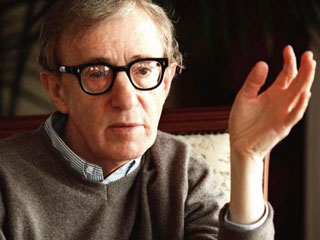Woody Allen's Base Motives
by M. Faust

What is so rare as a day in June? How about a day in September when Woody Allen holds a press conference?
Flanked by Colin Farrell, Ewan McGregor and Haley Atwell, the notoriously publicity-shy filmmaker met with international press for the Toronto Film Festival screening of his new film Cassandra’s Dream, which opens in Buffalo this weekend.
Revisiting the mood and themes of Match Point, Cassandra’s Dream stars Ewan McGregor and Colin Farrell as brothers who want more out of life than their working-class options offer them. Although Allen describes them as “two very nice boys, really,” they both get into serious financial troubles. Just as they’re at their most desperate, a chance comes to get out of their respective holes. But the price is one that may be more than they’re willing to pay: They have to kill a man.
After his stars testified to the joy of working with a director who doesn’t believe in wasting time on the set, the question was posed to Allen why he works so quickly. He replied, “You’ll think I’m being facetious, but I’m not a dedicated filmmaker. I’m lazy. To me making a film is not the end-all, be-all. I don’t have the patience to rehearse with actors, or to shoot coverage. I want to shoot, go home and get on with my life.
“I’m not saying it’s a good habit. Other filmmakers are more fastidious than me. They’ll shoot it from this angle and that angle, and adjust the lighting, and you’re there a few days for a scene that you can light and shoot in two hours.
“And actors like the idea of not doing the same thing 25 times, to bite off five, six pages of dialogue rather than little snippets. It lets them get going. There’s a lot of very talented actors out there, so if you hire them and don’t mess them up, they make you look good.”
It’s a method he discovered early in the game, he explained. “When I made my first film, Take the Money and Run, in 1969, it was a nightmare, there were all these people saying, ‘Hurry up, we’re wasting money, we have to get all these shots.’
“And I started thinking to myself, ‘This is crazy.’ I only went into films for the most shallow reasons, to meet women and so I wouldn’t have to live a really arduous life of drudgery. I had base motives—I didn’t want to work late to get a shot and miss the basketball game, kill myself on weekends, rehearse endlessly. My life is more important. My family, my children, my clarinet playing, all the so-called shallow stuff of life is more important to me than making a perfect film.
“I could probably do better work if I was more facile. I’m not a perfectionist—I don’t like to make a big production out of a film. I don’t brood about them—I make films to keep from brooding. There are many more painful things in life than films to brood about.
“I’ve been very lucky, and also a bit of a con man, because I’ve spent my whole life in American films and always had complete artistic freedom. I’ve always said that the only thing standing between me and greatness is me. There’s no excuse for me not to do good work because I’ve had all the freedom anyone could want.
“I’ve always worked outside the mainstream of Hollywood on small budgets. I always idolized people like Bergman and Fellini and Bunuel and DeSica—I always wanted to be a foreign filmmaker. And now by the strangest circumstances [international funding for his films] I’ve become one. I’ve shot in England and Spain and I’ve had offers from France and Italy, I’m working with Javier Bardem and Penelope Cruz, and I’ve achieved my young adult fantasy.”
Asked which of his films he’s the most proud of, Allen said, “I’m most proud that I always gave it my best shot. I’ve always treated the audience as if they were at least as smart as me, and generally smarter.”
Pressed, he admitted that he never watches his old films. “It would only aggravate. The good stuff, that’s what you’re paid to do. The bad stuff, the scenes I wish I could fix or do differently, you can’t change.”
Having finished shooting his next film in Spain, the comedy Vicky Cristina Barcelona with Scarlett Johansson, Penélope Cruz, Javier Bardem and Patricia Clarkson, Allen heads to what is for him even more foreign territory: Los Angeles. He hasn’t sold out to Hollywood, though: He’ll be directing for the stage, and an opera at that, Puccini’s one-act comedy Gianni Schicchi. Allen was one of three filmmakers, along with William Friedkin and David Cronenberg, recruited by Placido Domingo, the Los Angeles Opera’s general director.
Was he looking for a new challenge? Not to hear him tell it. “I was badgered into it—well, charmed into it—by Placido Domingo. I have no qualifications to do it. I like opera but I’m not an opera fanatic. I’ve directed in the theater, but only my own plays. But he was so charming…it’s a comic opera and he got it into his head that I could make a contribution. I did everything in my power to avoid his phone calls, to not meet with him, but I couldn’t say no in the end. So after I finish my next film next summer I’m going to do it. I hope my common sense gets me through it.”
|
Issue Navigation> Issue Index > v7n5: Mardi Gras 2008 (1/31/08) > Woody Allen's Base Motives This Week's Issue • Artvoice Daily • Artvoice TV • Events Calendar • Classifieds |









 Current Issue
Current Issue